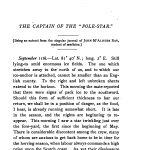
The Buccaneers were something higher than a mere band of marauders. They were a floating republic, with laws, usages, and discipline of their own. In their endless and remorseless quarrel with the Spaniards they had some semblance of right upon their side. Their bloody harryings of the cities of the Main were not more barbarous than the inroads of Spain upon the Netherlands—or upon the Caribs in these same American lands.
The chief of the Buccaneers, were he English or French, a Morgan or a Granmont, was still a responsible person, whose country might countenance him, or even praise him, so long as he refrained from any deed which might shock the leathery seventeenth-century conscience too outrageously. Some of them were touched with religion, and it is still remembered how Sawkins threw the dice overboard upon the Sabbath, and Daniel pistolled a man before the altar for irreverence.
But there came a day when the fleets of the Buccaneers no longer mustered at the Tortugas, and the solitary and outlawed pirate took their place. Yet even with him the tradition of restraint and of discipline still lingered; and among the early pirates, the Avorys, the Englands, and the Robertses, there remained some respect for human sentiment. They were more dangerous to the merchant than to the seaman.
But they in turn were replaced by more savage and desperate men, who frankly recognised that they would get no quarter in their war with the human race, and who swore that they would give as little as they got. Of their histories we know little that is trustworthy. They wrote no memoirs and left no trace, save an occasional blackened and blood-stained derelict adrift upon the face of the Atlantic. Their deeds could only be surmised from the long roll of ships which never made their port.
Searching the records of history, it is only here and there in an old-world trial that the veil that shrouds them seems for an instant to be lifted, and we catch a glimpse of some amazing and grotesque brutality behind. Such was the breed of Ned Low, of Gow the Scotchman, and of the infamous Sharkey, whose coal-black barque, the Happy Delivery, was known from the Newfoundland Banks to the mouths of the Orinoco as the dark forerunner of misery and of death.
There were many men, both among the islands and on the main, who had a blood feud with Sharkey, but not one who had suffered more bitterly than Copley Banks, of Kingston. Banks had been one of the leading sugar merchants of the West Indies. He was a man of position, a member of the Council, the husband of a Percival, and the cousin of the Governor of Virginia. His two sons had been sent to London to be educated, and their mother had gone over to bring them back. On their return voyage the ship, the Duchess of Cornwall, fell into the hands of Sharkey, and the whole family met with an infamous death.
Copley Banks said little when he heard the news, but he sank into a morose and enduring melancholy. He neglected his business, avoided his friends, and spent much of his time in the low taverns of the fishermen and seamen. There, amidst riot and devilry, he sat silently puffing at his pipe, with a set face and a smouldering eye. It was generally supposed that his misfortunes had shaken his wits, and his old friends looked at him askance, for the company which he kept was enough to bar him from honest men.
From time to time there came rumours of Sharkey over the sea. Sometimes it was from some schooner which had seen a great flame upon the horizon, and approaching to offer help to the burning ship, had fled away at the sight of the sleek, black barque, lurking like a wolf near a mangled sheep. Sometimes it was a frightened trader, which had come tearing in with her canvas curved like a lady’s bodice, because she had seen a patched fore-topsail rising slowly above the violet water-line. Sometimes it was from a Coaster, which had found a waterless Bahama Cay littered with sun-dried bodies.
Once there came a man who had been mate of a Guineaman, and who had escaped from the pirate’s hands. He could not speak—for reasons which Sharkey could best supply—but he could write, and he did write, to the very great interest of Copley Banks. For hours they sat together over the map, and the dumb man pointed here and there to outlying reefs and tortuous inlets, while his companion sat smoking in silence, with his unvarying face and his fiery eyes.
One morning, some two years after his misfortune, Mr. Copley Banks strode into his own office with his old air of energy and alertness. The manager stared at him in surprise, for it was months since he had shown any interest in business.
“Good morning, Mr. Banks!” said he.
“Good morning, Freeman. I see that Ruffling Harry is in the Bay.”
“Yes, sir; she clears for the Windward Islands on Wednesday.”
“I have other plans for her, Freeman. I have determined upon a slaving venture to Whydah.”
“But her cargo is ready, sir.”
“Then it must come out again, Freeman. My mind is made up, and the Ruffling Harry must go slaving to Whydah.”


